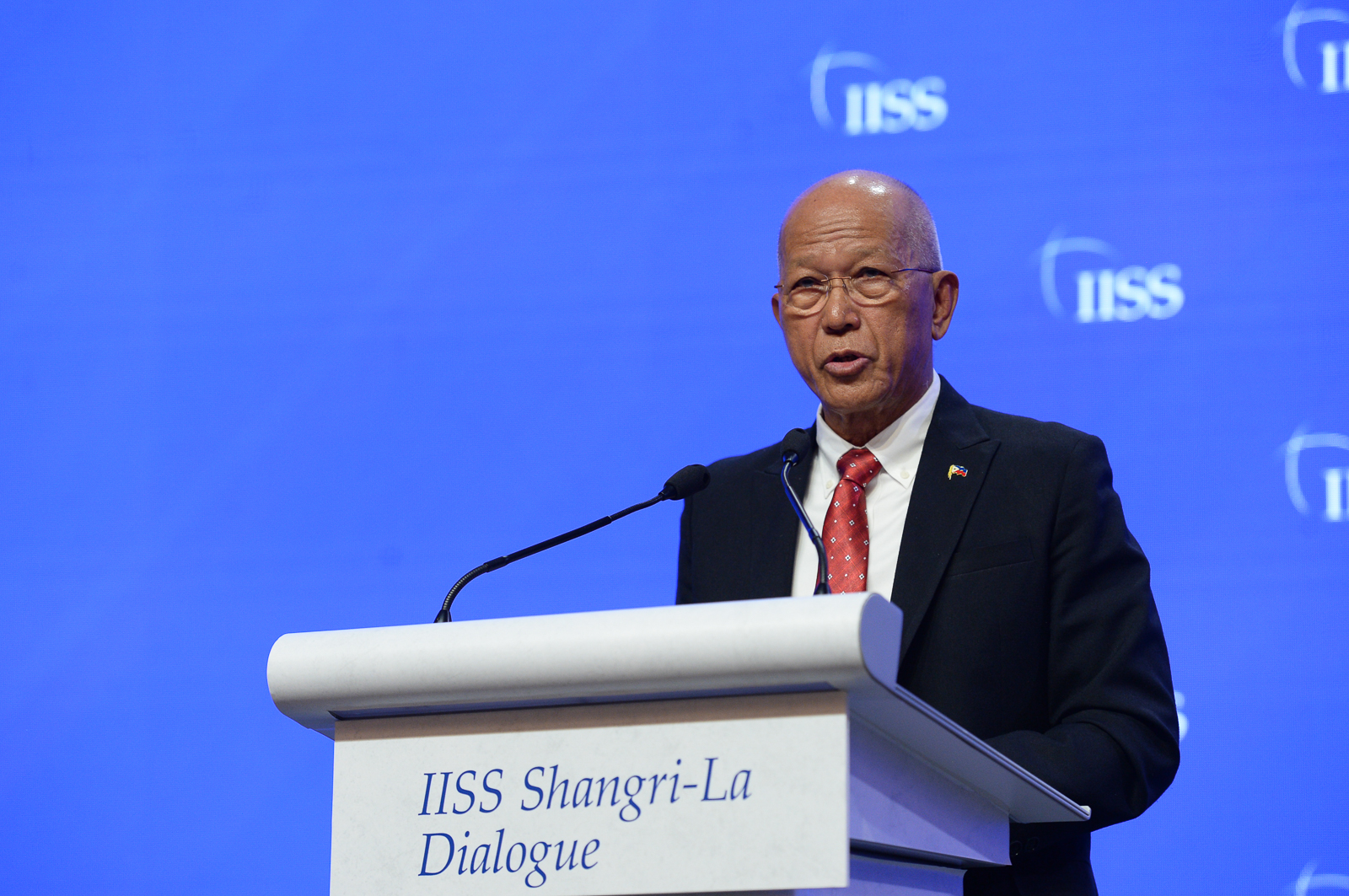Lorenzana admits China’s ‘bullying’; says Beijing’s peace ‘rhetoric’ just ‘optics’

Defense Secretary Delfin Lorenzana/ Photo from IISS Flickr (FILE PHOTO)
MANILA, Philippines — (UPDATED) China’s commitment to peace and stability and its assurances of adhering to international law when it comes to the South China Sea is inconsistent with their actions on the ground, Defense Secretary Delfin Lorenzana said Tuesday.
The defense chief was asked to comment on the speech of Ambassador Zhao Jianhua during the People’s Liberation Army (PLA) anniversary at the Makati Shangri-La on Monday.
“I’ve heard the version of the speech many times already… There’s nothing new with that. They are saying they want peace, but it does not match with what they are doing on the ground,” he told reporters.
The defense chief even thinks China’s takeover of Scarborough Shoal years ago was a form of “bullying.”
“Well, the way they took over Scarborough Shoal, to me that was bullying,” Lorenzana said.
The disputed shoal, a small ring of reefs, is located within the Philippines’ exclusive economic zone (EEZ). Beijing took control of the shoal in 2012 after a standoff between Philippine and Chinese government vessels.
At the PLA anniversary celebration on Monday, Zhao tackled the sea dispute and said that China will follow “the path of peaceful development” and they are committed to “peace and stability.”
He said China “will not take the first shot” as it moves to resolve the sea dispute with other claimants.
READ: China says it won’t take first shot amid maritime tension
“China will continue to work with the Philippines and other states directly concerned to resolve the relevant disputes in the South China Sea. Through bilateral negotiation and consultation on the basis of respecting historical fact in accordance with international law which also includes UNCLOS,” he said.
UNCLOS refers to the United Nations Convention on the Law of the Sea, an international treaty adopted and signed in 1982 which is concerned on territorial sea, contiguous zone, continental shelf, and high seas, as well as fishing and conservation of living resources on the high seas.
READ: China appeals for patience on sea disputes with other nations
Zhao further said that China is the last nation that would like to see that freedom of navigation in the South China Sea is “impeded or disrupted.”
But media reports about China challenging the presence of Philippine military and coast guard assets in or above the disputed waters surface every now and then seemed to prove otherwise.
READ: PH airs concern over Chinese radio warnings
At the Shangri-La Dialogue in June, Lorenzana said he had raised his doubts on China’s statements that it does not “bully people around” and it follows international law.
“I questioned them… What you are telling us is not what you are doing on the ground. Maybe until such time their actions (are) matched by their words, then what (they’re) saying is doubtful. It’s just optics, the narrative is to be heard [positively] just to keep us calm,” he said.
“It’s like a consolation for us but the bottom line is, their [words] do not match their actions in the West Philippine Sea,” Lorenzana said.
In recent years, China has occupied seven reefs and islands in the Spratly archipelago, some within the Philippines’ EEZ, and turned it into sprawling military outposts.
China claims it owns almost the entire South China Sea, but the Philippines, Vietnam, Taiwan, Brunei, and Malaysia also have overlapping claims in the resource-rich waterway.
The Permanent Court of Arbitration in The Hague ruled in 2016 that China’s nine-dash line and historic rights claims are invalid. But China refused to acknowledge the ruling.
Despite China’s “peaceful” discourse on the South China Sea, it was found to be the least trusted country by Filipinos according to a Pulse Asia survey released last week.
“Natural (Naturally)… Since they started grabbing the islands there, they are bullying people around; of course, people would doubt them. The US has high trust ratings because they do not bully us. We were once their colony but they never abused us. Until such time that China’s rhetoric will match their behavior, then the low trust of the Philippines will continue,” Lorenzana said. /kga
For comprehensive coverage, in-depth analysis, visit our special page for West Philippine Sea updates. Stay informed with articles, videos, and expert opinions.